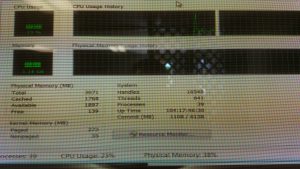HDD vs SSD – Difference and Comparison
Over the last 20+ years, people have used a very popular hardware device called a hard drive. The typical hard drive is a mechanical device that has a spindle inside of it that reads over a magnetic disk (platters) to retrieve your stored data. These became common place in computers many years ago.
Over the past few years there has been another type of drive that came out in the market. They are called Solid State Drives (‘SSD’ for short). SSDs allow for extremely quick and easy access to your data, so you do not experience long delays when accessing your data.
SSDs are completely electronic (no mechanical devices are used in its operation). This is what allows for the quick and easy access to data I mentioned earlier.
Now that you have a quick explanation of the two types of drives, I am going to give you some pros and cons of both of them.
Pros for Mechanical Hard Drives
- Cheaper to buy
- Usually can get more disk space for less money.
- Will be a better choice for storing important information (e.g., family photos, personal bank info, attorney letters, etc.). Note: You should have a backup of these files on external disks anyway. Never trust a hard drive to never fail.
Pros for Solid State Drives
- SSD are not (are at least should not be) affected by magnetism
- Practically no heat to worry about when using SSDs
- No moving parts = no noise to bother you
- SSDs use almost no power (less stress on your computer’s power supply)
- SSDs will be more reliable, due to the fact that they do not have mechanical parts in them
So there you have it. Both types of drives are good for different situations.
In my opinion, if you really want/need a fast hard drive, then go for an SSD.
On the other hand, if you need/want a lot of disk space to store important information on, then you will be more cost effective going with a mechanical hard drive.
Posted in Computers, Internet and Servers
Website Subdirectory vs. Subdomain: What is the Difference?
In this blog post, I am going to give a brief explanation of what sub-directories and sub-domains are in the context of websites. Which one is the best for a website? Well that is not an easy question to answer, however I’ll give my opinion (and experience) and let you make the final decision.
Simply put, a sub-directory is a directory right off a domain name (e.g., www.example.com/subdirectory).
A sub-domain is a little different. They look like this: mywebsite.example.com
First you must understand that in my experience, both sub-directories and sub-domains are not treated the same way by search engines (e.g., Google, Bing).
If I put something on www.example.com/myfiles, Google will see the “myfiles” part as a part of the main www.example.com domain.
However Google, from my experience, will treat a sub-domain as if it were separate from your main domain, and will not count myfiles.example.com as a part of your original example.com ranking.
To recap: Sub-directories are seen by search engines as a part of your main domain (e.g., www.example.com/myfiles goes with www.example.com).
Sub-domains are seen by search engines as separate from your main domain (e.g., myfiles.example.com does not go with www.example.com).
Do you see the difference? So which is better for a website you ask?
Well in my opinion:
Use a sub-directory when you want to make sure that your main domain (e.g., www.example.com) gets more attention from search engines, and in turn, hopefully a better search engine ranking.
Use a sub-domain when you either do not care about adding value to your main website and/or when you have a website or service so different from your main website, that you want search engines to treat it as if it were separate from your main domain.
Posted in Computers, Internet and Servers
What does the Bible Say About Taking Vengeance?
Romans 12:19 (ESV)
“Beloved, never avenge yourselves, but leave it to the wrath of God, for it is written, “Vengeance is mine, I will repay, says the Lord.”
Posted in Christian
